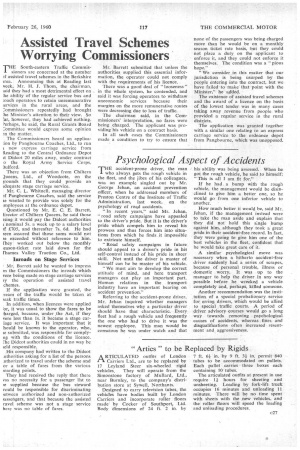Assisted Travel Schemes Worrying Commissioners
Page 65

If you've noticed an error in this article please click here to report it so we can fix it.
THE South-eastern Traffic Commis.' sioners are concerned at the number )f assisted travel schemes in the Berkshire irea. Announcing this at Reading last veek, Mr. H. J. Thom, the chairman, ;aid they had a most detrimental effect on he ability of the regular service bus and ;oach operators to retain unremunerative ;ervices in the rural areas, and the ommissioners repeatedly had brought he Minister's attention to their view. So !ar, however, they had achieved nothing. ?erhaps, he said, the Rural Grants Board :ommittee would express some opinion m the matter.
The Commissioners beard an applicaion by Pangbourne Coaches, Ltd., to run new express carriage service from Reading to the Central Ordnance Depot it Didcot 20 miles away, under contract
o the Royal Army Service Corps, Julford.
There was an objection from Chiltern tieens, Ltd., of Woodcote, on the ;rounds that they could provide an idequate stage carriage service.
Mr. C. L. Whitnell, managing director Pangbourne Coaches, said the service le wanted to provide was solely for the :mployees at the ordnance depot.
Questioned by Mr. E. C. E. Barrett, Erector of Chiltern Queens, be said those ming it would pay the Didcot authorities nominal 5s. a week up to a salary level if £705, and thereafter 7s. 6d. He had ieen assured that those sums would not ie exceeded without reference to him. [hey worked out below the monthly .eason-ticket rate laid down for the [lames Valley Traction Co., Ltd.
Inroads on Stage Services
Mr. Barrett said he wanted to impress in the Commissioners the inroads which sere being made on stage carriage services iy the operation of assisted travel chemes.
If the application were granted, the :ream of the traffic would be taken at seak traffic times.
In addition, when licences were applied br, it was usual to show the fares to be :harged, because, under the Act, if they vere less than Is. it became a stage cariage service. It was important that it hould be known to the operator, who, te submitted, was responsible for complyrig with the conditions of the licence. lie Didcot authorities could in no way be ield responsible.
His company had written to the Dideot ,uthorities asking for a list of the persons ,uthorized to travel under the scheme and or a table of fares from the various loarding points.
They had received the reply that there vas no necessity for a passenger list to ■ e supplied because the bus steward vould be responsible for discriminating ietween authorized and non-authorized ussengers, and that because the assisted ravel scheme was not a stage service here was no table of fares. Mr. Barrett submitted that unless the authorities supplied this essential information, the operator could not comply with the requirements of his licence.
There was a good deal of "looseness" in the whole system, he contended, and said it was forcing operators to withdraw uneconomic services because their margins on the more remunerative routes were decreasing due to loss of traffic. .
The chairman said, in the Commissioners' interpretation, no fares were being charged. The applicant was providing his vehicle on a contract basis.
In all such cases the Commissioners made a condition to try to ensure that none of the passengers was being charged more than he would be on a monthly season ticket rate basis, but they could not place a duty on the applicant to enforce it, and they could not enforce it themselves. The condition was a "pious hope."
"We consider in this matter that our jurisdiction is being usurped by the people entering into the contract, but we have failed to make that point with the Minister," he added.
The existence of assisted travel schemes and the award of a licence on the basis of the lowest tender was in many cases taking away revenue from people who provided a regular service in the rural disticts.
The application was granted together with a similar one relating to an express carriage service to the ordnance depot from Pangbourne, which was unopposed.
























































































































































































































